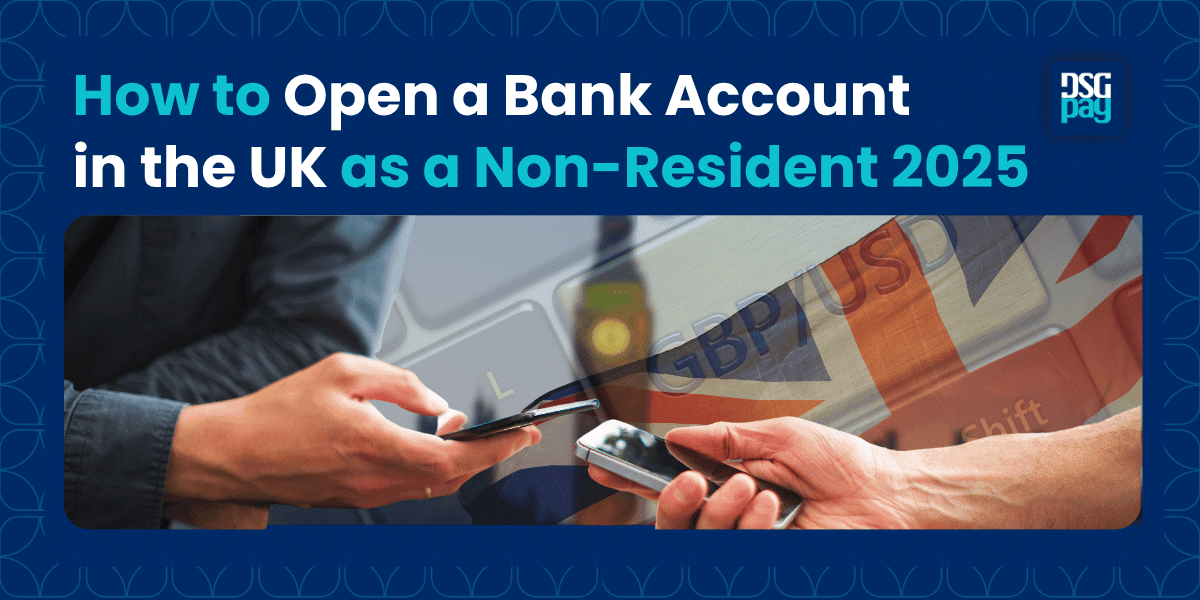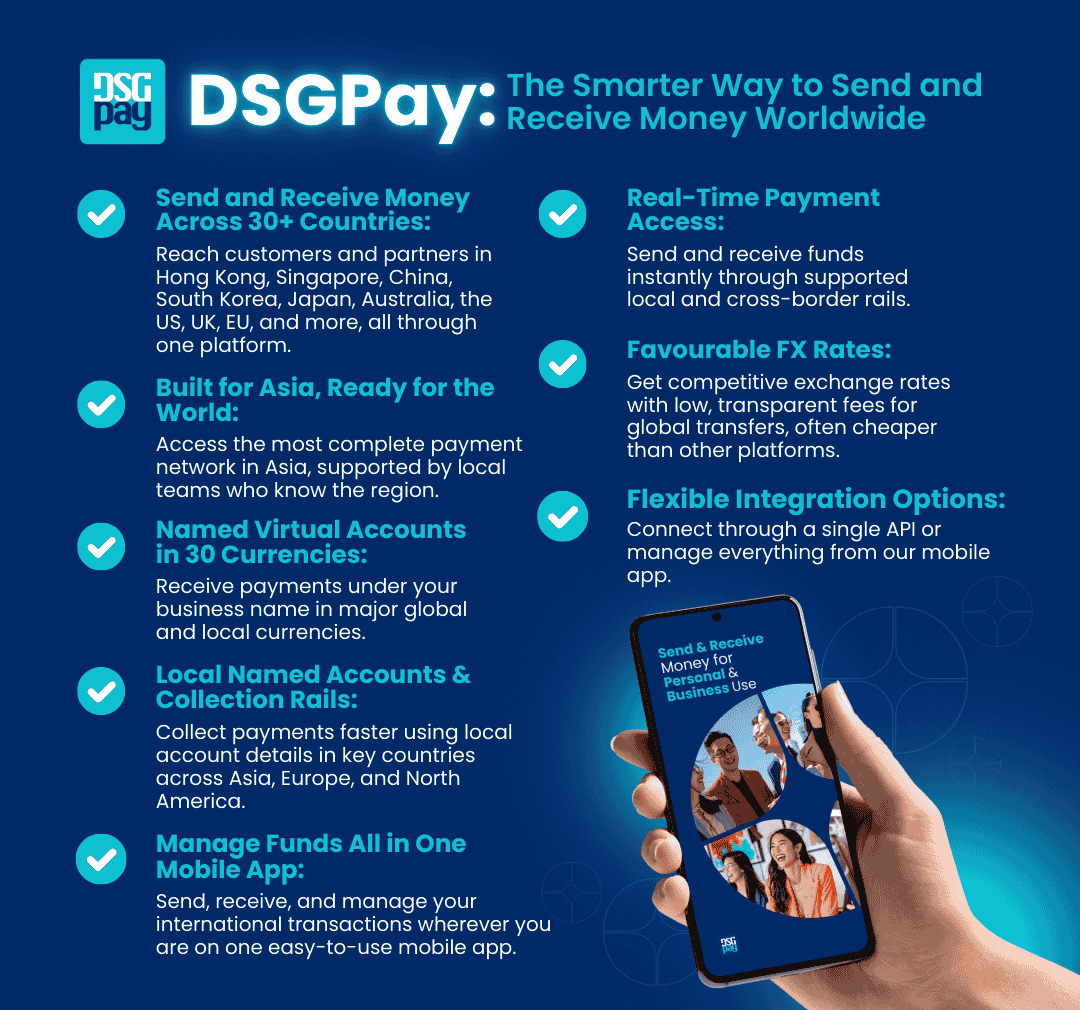The UK has long been one of the world’s most trusted financial hubs, drawing in students, professionals, and entrepreneurs who rely on the pound’s stability and the credibility of its banking system.
Whether you’re paying university fees, managing overseas transactions, or working with British partners, having a local account gives you a practical edge.
In this guide, we’ll walk you through how to open a bank account in the UK as a non-resident quickly and confidently, plus explore fintech alternatives that make managing your GBP payments simpler, faster, and far more convenient.
Table of Contents
Key Takeaways
- The UK’s banking sector is becoming increasingly digital, with 88% of adults now using online banking.
- Non-residents can open a UK bank account by choosing the right provider and preparing essential documents in advance.
- Fintech solutions have made remote account setup simple, fast, and accessible from anywhere in the world.
- Proof of identity, address, and income remain key requirements for verification.
- Traditional banks often have stricter eligibility rules, while fintech providers offer easier onboarding and greater flexibility.
- Multi-currency accounts now let non-residents manage GBP, EUR, and USD efficiently, without being tied to one country.
Can You Open a Bank Account in the UK as a Non-Resident?
Yes, you can open a bank account in the UK even if you are not living there.
The process depends on your residency status and the type of account you choose. While most traditional banks prefer applicants with a UK address, digital banking options have made it easier for people abroad to open accounts remotely.
There are different account types available to suit your needs. You can choose between personal, international, or business accounts depending on how you plan to use them.

Types of UK Bank Accounts for Non-Residents
Let’s take a look at the main types of UK bank accounts available for non-residents and find out which one best fits your goals.
- International accounts: Established names such as HSBC and Lloyds still serve non-residents through international or expat accounts. These accounts support global transfers and multiple currencies but often require a higher minimum balance or income threshold.
- Accounts for new arrivals: Some banks, such as Barclays and Lloyds, make life easier for newcomers by allowing them to start the setup process before they arrive in the UK. This way, you can access local banking within days of landing.
- Business accounts: If you’re launching a UK-registered company, a business account is essential. It helps you manage GBP transactions, send invoices, and handle international payments while building credibility with UK clients and partners.
Fintech Alternatives to UK Bank Accounts
Fintech platforms have transformed how non-residents manage money. With just a few clicks, you can open an account online, get local GBP details in minutes, and enjoy low-cost, transparent international transfers, no paperwork or long waits needed.
Here’s a quick look at some of the most popular fintech providers and what makes each one worth considering:
| Provider | Best For | Pros | Cons |
| Wise | Frequent travelers and global freelancers | Transparent fees, fast transfers, mid-market exchange rates | No physical branches or cash deposits |
| Revolut | Remote professionals and digital nomads | Easy onboarding, excellent mobile app, budgeting tools | Limited support for free users, some weekend fees |
| Monese | Newcomers without UK proof of address | Quick setup, inclusive verification, multilingual app | Fewer international transfer options |
| Payoneer | Freelancers and eCommerce sellers | Works with Amazon, Upwork, and Fiverr, low withdrawal fees | Slower verification process, not suited for personal banking |
| Skrill | Online businesses and crypto users | Instant transfers, prepaid card, simple cross-border payments | Higher fees on some transactions, limited account types |
Documents Required to Open a Bank Account in the UK
To open a bank account in the UK as a non-resident, you must provide proof of your identity, address, and income. Once you know what information banks typically ask for, the process becomes much simpler.
Here’s what most providers will require:
Proof of Identity
Start with your most reliable form of ID. Most banks and fintechs will ask for:
- Passport: The most widely accepted and recognised proof of identity.
- National ID card: Commonly used by EU citizens for verification.
- Driving licence: Some banks may accept foreign licences depending on their internal policy.
- Biometric Residence Permit (BRP): Valid for individuals who live or work in the UK.
Proof of Address
This is where most non-residents hit a wall. Traditional banks often require a UK address, while digital providers can verify a foreign one online. Typical options include:
- Utility bill or bank statement: Dated within the last three months and showing your name and address.
- Council tax bill or tenancy agreement: Accepted by most high street banks.
- Mortgage statement or employer letter: Helpful if you’re employed or renting in the UK.
Additional Documents
Depending on your account type, you may also need:
- Proof of income or employment: Payslips, an employment contract, or tax returns.
- National Insurance or Tax ID number: For identity verification and tax compliance.
- Business documents: If you’re opening a corporate account, include your company registration and proof of trading activity.
Step-by-Step: How to Open a Bank Account in the UK as a Non-Resident
The process is straightforward if you approach it in the right order. Follow these key steps to make your application efficient and hassle-free.
Step 1: Choose the right account
Start with clarity. What do you actually need the account for? A personal current account is great for everyday spending, a multi-currency or expat account suits people who move or work across countries, and a business account handles company payments smoothly. But if speed and flexibility are your priority, a fintech account is often the smartest and fastest option.
Step 2: Select your provider
Take time to compare. Check each bank’s eligibility criteria, supported countries, currencies, and fees. Traditional banks offer reassurance and a physical presence, while fintechs focus on convenience with quick approvals and full remote access.
Step 3: Prepare your documents
Get your paperwork ready before applying. You’ll usually need a valid passport or ID, proof of address, and proof of income or employment. For business accounts, add company registration details, director information, and proof of trading activity.
Step 4: Submit your application
Most fintechs let you apply online in minutes. Traditional banks might ask for certified copies or an in-person visit. Double-check that all details match your documents to avoid verification issues.
Step 5: Complete verification
Upload your ID, address proof, and any requested financial information. Some banks may ask for a quick video or selfie for security purposes. Respond promptly so your application keeps moving.
Step 6: Get approved and activate your account
Once approved, you’ll receive your account number and sort code. Log in, fund your account, and set up security preferences. If your provider offers mobile banking, add your card to a digital wallet for easier access.
Step 7: Keep your account in good standing
Stay compliant by updating documents when needed, monitoring your transactions, and using the account regularly. Set up alerts to track fees and activity so your banking stays smooth and secure.
Fees, Transfers & Exchange Rates
Understanding the costs involved is just as important as choosing the right account, as fees and exchange rates can greatly affect how much you actually save or spend.
| Provider Type | Typical Fee (sending ~£1,000) | FX Mark-up or Extra Costs | Additional Info |
| Traditional high-street bank | £9.50 plus correspondent/intermediary fees ~£12-£20. | FX rate mark-up estimated 1%-4% above mid-market. | Requires UK address, may have higher hidden costs |
| Fintech platforms | Fee often £1 to £5 of amount | Uses near-mid-market FX rate, minimal hidden markup | Fully online, accepts non-residents more easily |
Tax, Compliance & Reporting
Opening a UK bank account as a non-resident comes with specific tax and reporting responsibilities. Here’s what you need to know to stay compliant and avoid surprises:
- Tax scope: If you are not a UK tax resident, you are generally taxed only on income from UK sources, such as:
- Interest earned from UK bank accounts.
- Rental income from UK properties.
- Employment income from UK-based jobs.
- Residency status: Check your position under the UK Statutory Residence Test. Your residency determines whether you owe tax only on UK income or on your worldwide income.
- Double taxation agreements (DTAs): The UK has treaties with many countries that prevent you from being taxed twice on the same income. These agreements may reduce UK tax rates or allow foreign tax credits.
- Global reporting rules: UK banks comply with FATCA and CRS, which require them to collect your tax residency details and Tax Identification Number (TIN). Your account information may be shared with tax authorities in your home country.
- Record-keeping: Keep organised records of your:
- Bank statements
- UK-source income
- Taxes paid
- Proof of your residency status
Staying proactive with documentation makes compliance easier and reduces the risk of penalties later.
Common Challenges When You Open a Bank Account in the UK as a Non-Resident
Opening a bank account in the UK as a non-resident is possible, but there are a few common hurdles you might face. Knowing these helps you prepare and avoid delays.
- No UK credit history: If you’re new to the UK, you won’t have a local credit record yet. While this isn’t a dealbreaker, it can slow things down as banks assess your eligibility.
- Different bank policies: Each provider operates differently. Some traditional banks have strict requirements for non-residents, while fintechs tend to offer simpler, fully online applications. Knowing where you fit saves time and frustration.
- Extra verification checks: UK banks are legally required to run thorough checks to prevent money laundering and fraud. Don’t be surprised if you’re asked extra questions about your source of income or employment history.
Final Thought
Opening a bank account in the UK as a non-resident is ultimately about preparation and choice. The process may vary between providers, but with the right documents and a clear understanding of your banking goals, it can be completed smoothly.
Before you apply, take time to compare your options, review account features, and ensure you meet all compliance requirements. Whether you value the reliability of a traditional bank or the convenience of a fintech platform, the UK continues to be a trusted and secure hub for managing your finances in 2025.

Open a GBP Virtual Account with DSGPay from Anywhere in the World
With DSGPay, you can send, receive, and hold GBP just like having a local UK account, while also enjoying access to over 30 currencies. It’s the easiest way to connect with the UK market, make international transfers, and manage cross-border payments securely and conveniently.
What makes DSGPay ideal for non-residents:
- Named GBP Virtual Accounts: Receive and hold GBP payments just like a local account, ideal for clients, suppliers, or partners in the UK.
- Multi-currency Flexibility: Manage over 30 currencies, including GBP, EUR, USD, and more from one account, making cross-border payments easier.
- Low FX & Transparent Rates: Benefit from competitive exchange rates and clear pricing with no hidden costs.
- Fast, Online Setup: Open your account remotely, upload your documents for digital verification, and get approved within a few business days.
- Real-Time Tracking and Notifications: Send and receive funds internationally with full visibility and instant tracking.
How to Open a GBP Account with DSGPay
- Sign up online: Create your personal or business account on the DSGPay mobile application.
- Upload documents: Provide your passport or national ID, proof of address, and if needed, company registration documents and director details.
- Complete verification: DSGPay reviews your information through a secure KYC process that typically takes one to two business days.
- Activate your account: Once verified, you will receive your GBP virtual account details directly in your DSGPay dashboard.
- Start managing funds: Receive payments in pounds, hold and convert multiple currencies, and transfer money globally from one convenient platform.
With DSGPay, non-residents can connect to the UK financial system with ease. It’s a faster, simpler, and more flexible way to open a GBP account in the UK and manage your international finances in 2025.




